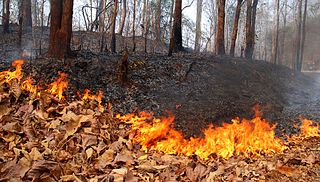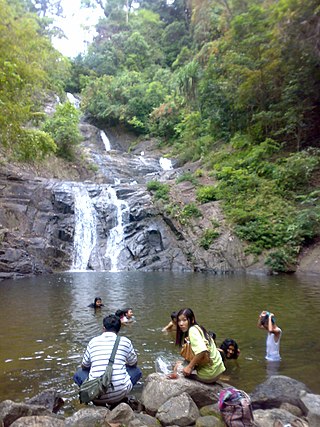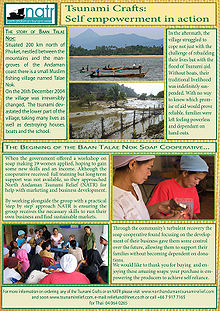
The Andaman Islands are an archipelago, made up of 200 islands, in the northeastern Indian Ocean about 130 km (81 mi) southwest off the coasts of Myanmar's Ayeyarwady Region. Together with the Nicobar Islands to their south, the Andamans serve as a maritime boundary between the Bay of Bengal to the west and the Andaman Sea to the east. Most of the islands are part of the Andaman and Nicobar Islands, a Union Territory of India, while the Coco Islands and Preparis Island are part of the Yangon Region of Myanmar.

Krabi is a province (changwat) of southern Thailand, on the shore of the Andaman Sea. Neighbouring provinces are Phang Nga, Surat Thani, Nakhon Si Thammarat, and Trang. Phuket province lies to the west across Phang Nga Bay. Krabi town is the seat of the provincial government.

On 26 December 2004, at 07:58:53 local time (UTC+7), a major earthquake with a magnitude of 9.1–9.3 struck with an epicentre off the west coast of northern Sumatra, Indonesia. The undersea megathrust earthquake, known by the scientific community as the Sumatra–Andaman earthquake, was caused by a rupture along the fault between the Burma Plate and the Indian Plate, and reached a Mercalli intensity up to IX in some areas.

The Surin Islands is a continental archipelago of five islands in the Andaman Sea, 55 kilometres (34 mi) from the Thai mainland. Administratively, the islands are part of Tambon Ko Phra Thong, Khura Buri district, in Phang Nga province, Thailand.

Thailand's dramatic economic growth has caused numerous environmental issues. The country faces problems with air, declining wildlife populations, deforestation, soil erosion, water scarcity, and waste issues. According to a 2004 indicator, the cost of air and water pollution for the country scales up to approximately 1.6–2.6% of GDP per year. As such, Thailand's economic growth has come at great cost in damage to its people and environment.

Seacology is a nonprofit 501(c)(3) charitable organization headquartered in Berkeley, California, that works to preserve island ecosystems and cultures around the world. Founded in 1991, it began with the work of ethnobotanist Paul Alan Cox, who researched tropical plants and their medicinal value in the village of Falealupo in Samoa during the mid-1980s. When the villagers were pressured into selling logging rights to their rainforest in 1988 to build a new school, Cox and his wife offered to help secure funds for the new school in return for an agreement with the villagers to protect their forest. With the help of his friends and family, Cox secured the funds within six months, later earning him and the village chief, Fuiono Senio, the Goldman Environmental Prize for their efforts. Word spread throughout the islands, and with increasing demand for similar projects, Cox, along with Bill Marré and Ken Murdock, decided to form Seacology and expand their work internationally. For the first few years, the organization operated on a volunteer basis.
International Student Volunteers (ISV) is a non-profit organization located in Yorba Linda, California, that operates on a voluntary basis. The organization provides educational volunteer and travel adventure programs designed for university students and youth on a global scale.
Openmind Projects (OMP), in Nong Khai Province, Thailand is a developmental aid organisation focused on helping communities in Thailand, Laos, Cambodia, and Nepal through the creation and management of grass roots projects in the areas of e-learning, education, and environment. The focus of the organisation is using information and communication technologies (ICT) to educate individuals in schools, orphanages, national parks, and villages. Projects rely on volunteers to promote changes in local communities.
Living River Siam is a Thai non-governmental organization (NGO) which analyzes the impact of Thailand's various dam projects and coordinates the research of indigenous peoples to give Thai villagers the power to document the influence of local rivers and dams. Founded in 1999, it gained prominence during the Pak Mun Dam study period in 2001, when it developed a method for instructing villagers on how to document the effects of the dammed river on their lives. When the Thai government proposed other dam sites, Living River Siam took its research methods to the villages surrounding those sites as well. Today, the organization works with other NGOs in Southeast Asia to counter government-sponsored research that encourages dam construction.

InterVol is a community volunteering charity based in the United Kingdom. InterVol support poverty reduction, conservation and education projects globally, as well as community volunteering based on university campuses in the United Kingdom. The charity is based at the University of Birmingham, Imperial College London, Lancaster University, University of Nottingham, and Oxford Brookes University.
Nature Seekers is a community-based organization founded in 1990 with the aim of protecting nesting leatherback turtles in Trinidad and Tobago. The ultimate goal of the group was to reduce the problem of poaching which stood at 30 percent on a nightly basis. Through the efforts of tour guide services to visitors on Matura Beach, tagging of turtles, and patrolling the group has been able to reduce the percentage of poaching from 30 percent to zero. Now the group has expanded to include reforestation, waste recycling and natural jewelry with its core still being turtle conservation.

Community forestry is an evolving branch of forestry whereby the local community plays a significant role in forest management and land use decision making by themselves in the facilitating support of government as well as change agents. It involves the participation and collaboration of various stakeholders including community, government and non-governmental organisations (NGOs). The level of involvement of each of these groups is dependent on the specific community forest project, the management system in use and the region. It gained prominence in the mid-1970s and examples of community forestry can now be seen in many countries including Nepal, Indonesia, Korea, Brazil, India and North America.
Responsible tourism is a relatively modern concept in the Kingdom of Thailand that took root in the late-1990s. It is underpinned by the belief that tourism should develop in a manner that minimizes negative impacts on local communities, and wherever possible ensure that a positive symbiosis exists between hosts and visitors. Responsible travel promotes a respect for indigenous culture, the minimization of the negative environmental impacts of tourism, active participation in volunteering to assist local communities, and the structuring of businesses to benefit the final service provider rather than an international agent.
Community-based management (CBM) is a bottom up approach of organization which can be facilitated by an upper government or NGO structure but it aims for local stakeholder participation in the planning, research, development, management and policy making for a community as a whole. The decentralization of managing tactics enables local people to deal with the unique social, political and ecological problems their community might face and find solutions ideal to their situation. Overwhelming national or local economic, political and social pressures can affect the efficiency of CBM as well as its long term application. CBM varies across spatial and temporal scales to reflect the ever-changing distinctive physical and/or human environment it is acting within. While the specifics of each practice might differ, existing research maintains that community based management, when implemented properly, is incredibly beneficial not only for the health of the environment, but also for the well-being of the stakeholders.

Green Fins is an approach to sustainable marine tourism activities operating in Southeast Asia, Caribbean and the Indian Ocean that works with business operators, communities and governments. It helps to implement environmental standards for the diving and snorkelling industry through a code of conduct. The overall aim of the initiative is to mitigate damaging impacts to the marine environment from the marine tourism sector and improve sustainability. The code of conduct is a set of 15 points designed to tackle the most common and detrimental effects of scuba diving and snorkelling activities on the habitat in which they operate.
Aid Still Required (ASR) is a not for profit 501(c)(3) organization committed to bringing attention and humanitarian aid to areas suffering from natural disasters or human crises. Incorporated in Santa Monica, California, US, in 2008. The name, "Aid Still Required" and the mission were born out of the need to bring these issues back into the spotlight after they have left the news headlines and public awareness. Aid Still Required indicates its commitment to finding innovative ways to build back these regions through environmentally sustainable means. Future project locations are Thailand, Appalachia, NYC First Responders, Haiti, and the Gulf Oil.

The Menai Bay Conservation Area (MBCA) is located in Menai Bay, Zanzibar Tanzania. At 470 square kilometres (180 sq mi), it is Zanzibar's largest marine protected area. It was officially established as a conservation area in August 1997 in the traditional fishing area, known as Unguja Island, covering the tropical marine environment comprising extensive coral reefs, tropical fish, sea grasses, and mangrove forests. In addition to controlling illegal fishing, MBCA's alternative initiatives have included bee keeping, mangrove replanting, tree nurseries and tourism. The management of the MBCA falls upon the Fisheries Department and the bay's local villages. It is rated by the IUCN as Category VI Managed Resource Protected Area.
Blue Ventures is a registered charity focused on nurturing locally led marine conservation. The organisation partners with coastal communities that depend on marine resources.

The Andaman Nicobar Environment Team (ANET) field station is a multidisciplinary research and intervention facility focusing on environmental sustainability, located at North Wandoor, South Andaman, and the only research base of its kind in the Andaman and Nicobar Islands. With its mission to develop effective conservation strategies and community wellbeing based on a sound understanding of the islands' diverse social-ecological systems, ANET aims to contribute to resolving environmental and societal challenges in the islands through independent interventions, inter-organisational collaborations and the facilitation of engagements by organisations with similar visions and goals. ANET is owned and operated by Dakshin Foundation, Bangalore.

Khao Lampi–Hat Thai Mueang National Park is a national park in Phang Nga Province, Thailand. The park is named for its two separate sections: Khao Lampi named for the park section containing Lampi mountain range and Hat Thai Mueang, the beach section of the park.













